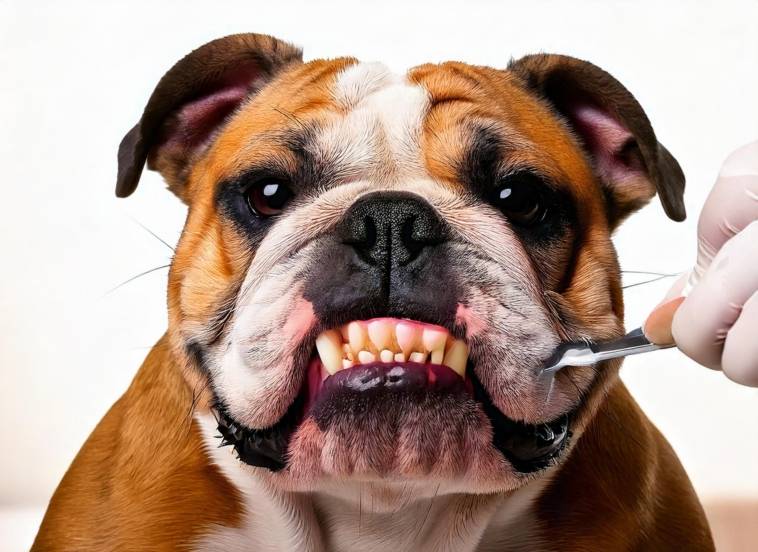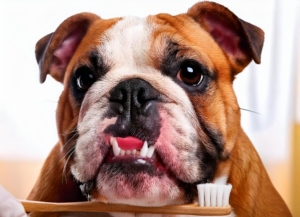Here’s an overview:
Introduction: Bulldog’s Oral Health
The Dental Structure of the Bulldog
What are the common Mouth problems seen in Bulldogs
Why are the dental check-ups important for Bulldogso
Daily Cleaning of Bulldog’s Mouth and Teeth
Considerations When Buying Dental Products for Bulldogs
Protection against Bulldog’s Dental Health Pathology
What You Should Know Before The Procedure: Dental Care For Bulldog’s Oral Health
How To Manage Bulldog Bad Breath
Bulldog Dental Care for Puppies and Adults
Holistic Approaches towards Improving Dental Health
Maintaining and administering Bulldog’s Oral Health
Introduction: Bulldog’s Oral Health
Good oral health in a Bulldog is important for its entire body. Bulldogs, just as any other breed of dogs, are likely to experience dental issues because of their unique jaw structure and facial features. Regular maintenance of oral hygiene practices is important in preventing the usual complications, such as.
- Periodontal Disease: These breeds tend to suffer from gum disease.
- Halitosis: This is usually a symptom of other dental problems.
- Plaque and Tartar Build-Up: A result of neglect and poor oral hygiene practices.
For every Bulldog owner, routine veterinarian appointments and other good home care practices are not negotiable. As a measure of supporting their dental health, everyone should thoroughly brush the mouths of the animals every day and also make sure to use dental products designed specifically for bulldogs.
The Dental Structure of the Bulldog
Bulldogs have a very distinct oral cavity that attracts great interest and care. Most bulldogs also have misaligned teeth which creates quite a lot of plaque in the mouth and that is due to the shape of their skulls being brachycephalic or short nosed. Bulldogs are equipped with 42 teeth, 20 of which are in the upper jaw and 22 are located in the lower jaw. The teeth can be grouped according to the following criteria: shape and function.
- Incisors: Gripping and tearing food with these teeth.
- Canines: For grasping and puncturing.
- Premolars and Molars: For crushing and grinding larger particles of food.
Bulldogs are fond of many problems related to oral cavity which include malocclusion, gingivitis, periodontal disease, etc. It is recommended to get dental evaluations performed regularly and most importantly cleans in cases where possible.
What are the common Mouth problems seen in Bulldogs
Due to genetically acquired facial structures and other factors, bulldogs can develop some oral conditions.
- Periodontal disease: Mostly gum disease but leads to bone loss and eventually death of teeth if untreated.
- Halitosis: Chronic bad smell, usually due to bacterial plaque or due to infection.
- Dental caries: Caused by poor nutritional habits or negligence of dental hygiene, leads to perforation.
- Gingivitis: Commonly inflammation of gums which is a mild form of periodontal disease.
- Teeth overcrowding: They generally have short snouts which result in crowding of teeth or misalignment which makes cleaning difficult.
- Persistent deciduous teeth: Failure to lose baby teeth results in having some of the permanent teeth penetrate and create problems.
Why are the dental check-ups important for Bulldogs
As stated above, bulldogs suffer from many dental problems and therefore routine cleanings are important. These allow the veterinarian to do the following.
- Assess current dental diseases: Like deposited heavy tartar, gingival inflammation and other more advanced sicknesses.
- Schedule cleanings: Tartar as well as plaque which regular brushing cannot do can be removed during regular cleanings.
- Observe any existing conditions or treat them: These include abscesses, broken teeth, or any oral tumors.
- Jaw and tooth formation assessment: Evaluating for the presence of anomalies that might hinder the process of eating or grooming.
- Educate clients comprehensively: Based on their experience, provide solutions for brushing, eating, and the use of general solvents.
Daily Cleaning of Bulldog’s Mouth and Teeth
Bulldogs require oral care for their dentition to remain healthy and functional. Therefore owners should:
- Clean their dogs’ teeth at least once a day: Most suitable tools are dog toothbrushes with dog toothpaste.
- Observe their pets’ mouth and jaws: The lesions should not be red or swollen, and the mouths shouldn’t emit unpleasant smells.
- Use dental sticks: They form part of the diet, help in removing debris off the teeth and help to decrease plaque.
- Provide chewing toys: These help clean their teeth and satisfy their urge to chew.
- Keep an eye on their eating habits: Early assessment of the mouth can reveal signs of pain.
- Bring bulldogs to the veterinarian’s clinics or researches regularly because of the importance of teeth cleaning: This must be performed on a regular basis amongst mammalian patients.
Good oral hygiene will reduce many typical dental concerns such as bad breath and building up of tartar and disease of the gums which is a major factor adding to the bulldog’s health.
Considerations When Buying Dental Products for Bulldogs
There are a number of factors to be examined when buying the right dental products for a bulldog.
- What soak the brush and cream is used to clean the teeth: A soft bristled dog toothbrush should be used. The dog toothpaste should be used and not human which is toxic.
- Dental Chews: Use dental chews and chew toys that help in plaque removal.
- Water Additives: Remember to use water additives that have been approved by a veterinarian that support the health of the mouth.
- Regular Dental Exams: Try arranging a visit to the vet so as to allow the pet monitor dental health.
- Avoid Human Products: This implies steer clear of dental products meant for humans as they are sure to be harmless to bulldogs.
- Hygiene, Dental Diet and Treats: What to Know include Orthodontics and Preventative Dentistry
To complement the efforts of brushing, there is much more that is involved in taking care of a Bulldog’s teeth. Nutrition and treats are also important factors.
- Dry Kibble: Purchase dry kibble of good quality in order to aid in plaque removal.
- Dental Chews: Provide dental chews that have been endorsed by vet’s approval to assist in cleaning the teeth.
- No sugary treats: Use other types of snacks in order to avoid getting sweet tooth and causing rot in teeth.
- Raw Bones: Raw bones can be given once in a while but must be controlled so that there is no threat of choking.
- Additives: Use corrugated additives to the water to prevent plaque formation and elimination of bad mouth odor.
Considerable amount of enhancement is brought about in the concept of dental hygiene of a Bulldog due to balanced diet.
Other Oral Hygiene Issues:
Bulldog pet owners need to be in the lookout for signs that will indicate any complications with regard to oral health of the dog. There are also some signs below that are worth watching out for:
- Bad Breath: An awful smell that remains is likely to be caused by dental disease.
- Gums that are red or bleeding: It can suggest there is an inflammation or therein may exist an infection.
- Drooling excessively: This might result from oral discomfort or something abnormal.
- Won’t eat: Difficulty in chewing could mean that there is pain.
- Teeth that are sore or there are gaps because of the absence of teeth: These might be signs of some severe form of gingivitis.
- Facial or mouth edema: May point to possible abscesses or a dental infection.
- Repeatedly pawing the area surrounding the mouth: This may indicate inflammation or pain is present.
- Roughly visible yellowish tartar deposits on the teeth: Hard yellow or brown yellow deposits on the teeth.
Protection against Bulldog’s Dental Health Pathology
The frequency of oral diseases occurring within the bulldog can be minimized by routine brushing of the dog’s teeth. Toothpaste specially formulated for dogs and a toothbrush with soft bristles should be used. Dental chews cause the sloughing off of plaque and tartar from the guy’s teeth as well. On top of that it is important to:
- Plan for an annual cleaning with the veterinary.
- Look out for changes which may signal dental pain or discomfort.
- Provide a well balanced diet with suitable size kibbles.
- Hard bones or hard toys which are potentially capable of causing wear and tear to the teeth need to be avoided.
Taking care of these conditions will help to prevent the most common problems associated with this breed including periodontal disease, and pathology of the gums that is gingivitis. It should be emphasized that in bulldogs, time is crucial for almost all oral diseases.
What You Should Know Before The Procedure Dental Care For Bulldog’s Oral Health
Before going to the vet for a professional bulldog dental cleaning on a bulldog, a number of steps are completed:
- Basic Examination: The veterinarian takes a closer look into the bulldog’s teeth, gums and mouth.
- Sedation: Sedation is performed chicken for the welfare of the bulldog due to the level of anxiety that may be found in the bulldog.
- Removal of Tartar and Plaque: The scaling procedure involves the removal of plaques and tartars that are located both above and below the collar line of the teeth.
- Smoothing the Teeth Surfaces: The polish is performed to assist in smoothing the surfaces and edges of the teeth and also to help in preventing plaque-forming bacteria.
- Application of Fluoride Solutions: The use of a fluoride treatment or application helps to strengthen the bulldog’s teeth and also helps to reduce the sensitivity of the teeth.
- Final Examination: Checks are done to confirm if there are any other teeth that may need further treatment in addition to the tooth that was cleaned.
How To Manage Bulldog Bad Breath
To prevent bulldogs suffering from breathing difficulties, a proper oral hygiene regimen must be maintained. If teeth brushing are done on a bulldog at least three times in a week, the amount of bacteria that causes odor is most likely to be minimal. Certain dog teeth cleaning products must be used.
- Brushing Your Pet’s Teeth With Dog Toothpaste: It is advised to use dog toothpaste and a toothbrush with soft bristles.
- Oral Hygiene: Make and give your pet some dental chews that will assist in cleaning their teeth and integrate other options.
- Avoiding Bad Smells From Dogs: Ensure to provide a balanced approach diet to the bulldog in order to reduce the chances of bad breath resulting from a dog’s diet.
- Preventive Veterinary Measures: Serious concerns such as oral cancer can be effectively prevented if proper and timely dental checkups are carried out on the bulldogs.
- Medicated Water Additives: Dissolve and use water additives that are safe for dogs and in this case, plant-derived that can help prevent plaque and tartar.
Bulldog Dental Care for Puppies and Adults
Patience and consistent care are integral for bulldog dental care. Puppies and adults tend to have care in different stages. Puppies’ focus should be on:
- Familiarity with Toothbrush: Begin brushing with light pressure to ease them into getting used to this action.
- Toys for the Sore Gum: Introduce the use of chew toys that can be used during this period of pain.
- Regular Vet Appointments: Arrange for a vet examination for proper assessment of dental growth.
In regards to adult Bulldog’s Oral Health it becomes necessary to observe:
- Teeth Scrubbings: To possibly sweat plaque from forming, teeth should be scrubbed from twos per week.
- Functional Snacks: Teeth-targeted formulas can be used as snacks.
- Dental Hygiene: Dentists do advise and advocate for yearly cleanliness of the mouth hygiene.
Holistic Approaches towards Improving Dental Health
There are a few structural interventions that different bulldog owners can look into to focus on maintaining oral hygiene of the pet. They say an ounce of prevention is worth a pound of cure: if these are incorporated, there will be a drastic decrease in the amount of plaque as well as bad breath.
- Coconut Oil: These are water soluble so just a tiny dab in the mouth and around the gums should suffice as a bacterial shield.
- Snap Peas and Straw Apples: As a bonus, offer these stunning fruits and veggies for their stunning crunch dry foods foster tooth care as well.
- Herbal Additions: Parsley or mint may also be added to their diet for a fresh breath.
- Raw Bones: Chomping on raw bones can aid in the removal of tartar. Such processes require some watching to prevent choking.
Genetics of the Bulldog’s
Oral health is hereditary in Bully’s genetic self and jaw, among great differences in the bone structure such as teeth placement. Bulldogs are genetically sensitive to a few dental ailments, which include;
- Malocclusion: Any bulge, or in this case a poorly defined shape of the skull usually under development is a perfect seed of misaligned shape.
- Overcrowded Teeth: Overcrowding of a bulldogs mouth that tries to fit perfectly deep cuts increases chances of plaque space occupancy.
- Gum Disease: Ye, genetics can be blamed for any bulldog having an increased chance for acquiring periodontal diseases.
Maintaining and administering Bulldog’s Oral Health
- Daily brushing their Teeth More Dog will have to use a proper canine toothpaste and toothbrush.
- Reducing the level of plaque and tartar in the mouth with the aid of a dental rinse or even a water additive is promising.
- Offer suitable dental chews and oral health promoting toys to their Bulldogs.
- Schedule a follow up with the veterinarian for regular dental cleaning to avoid people who might not be bright.
- at least, Once a week and don’t forget to check the gums and teeth for this as well, diseased aspects.
- Provide a balanced diet with a balance of fats, carbohydrates, proteins, vitamins, and minerals for optimal dental health.
- Do not allow them to chew on harder bones or items that will break their teeth.
Given this point, it can further concluded that avoiding periodontal disease entails discipline and practice to keep your bulldog both happy and healthy.





